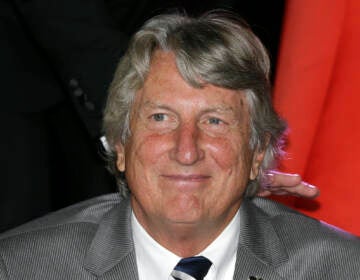Memories of Normandy
The invasion of Normandy marks the turning point in WWII when the allies launched a major offensive to drive the German army out of France.

A visitor wearing a U.S. military uniform walks past graves at the American cemetary, in Colleville-sur-Mer, western France, in this June 6, 2007 file photo. (Remy de la Mauviniere/AP Photo)
As we celebrate the 75th anniversary of D-Day, I am caught up in memories of our time in Normandy 15 years ago.
My husband and I had planned our visit in May 2004 for the 60th anniversary; we wanted to give returning veterans the space they deserved for the actual June 6 date. We walked the battlefields and cemeteries, talked with aging cafe owners and appreciated the fine museum at Caen. But what affected us most was our experience in nearby Bayeux, the charming town with a unique tapestry display depicting the Norman conquest of England.
After viewing the tapestries, we strolled Bayeux’s quiet streets, looking into the windows of the small shops. Suddenly, we noticed a sign in one of the windows. Yellowed with age, frayed at its corners, the sign stated boldly: “Thank you, America, for Saving Us!” We stared at the sign for some time, then at similar ones in other shops. It was clear that these signs had been carefully put away for D-Day anniversaries when the townspeople could show their gratitude. Perhaps the shop owners were — and are — hoping that Americans and other visitors would pass by and see them, and be as touched as we were.
Beyond a major anniversary of Allied victories, 2004 was a meaningful year in a different, negative way. The war with Iraq was in full sway, with the torture of prisoners at sites like Abu Ghraib grabbing headlines everywhere. (Our sister-in-law asked if we had hidden our American faces as we traveled through France. Watching the endless news feed on international television, we thought it might not have been a bad idea!) And though now closed, Abu Ghraib has become code for what happens when soldiers act on their uglier impulses.
Now we commemorate D-Day’s 75th anniversary. Veterans will probably come together there for the last time, to mourn dead colleagues and celebrate a turning point of World War II. Our nation has seen good and bad moments in the past 15 years and is now struggling with a polarized population as well as the never-ending Afghan war. This may not be the worst of times, but the political climate is decidedly grim.
Yet somehow, remembering the sweet signs in the Bayeux windows, one can feel better about our nation—and how it has been able to weather terrible times. We have to ask ourselves: if it had not been for America — and our allies — where would France and the rest of Europe, and Asia, be now? There are lessons here, perhaps the most critical the need to keep connections with other countries, despite a despotic pushing us away from old and trusted friends. The expression “first among equals” describes where we still stand; the countries who have been loyal to us for so long are indeed our equals.
The America which was thanked by the people of Bayeux—and others—has not disappeared. But besides being proud of our military and civilian history, our citizens must be vigilant against leaders who try to push everyone else aside. We are part of a world community as we were 75 years ago. Such are the lessons of D-Day.
WHYY is your source for fact-based, in-depth journalism and information. As a nonprofit organization, we rely on financial support from readers like you. Please give today.




